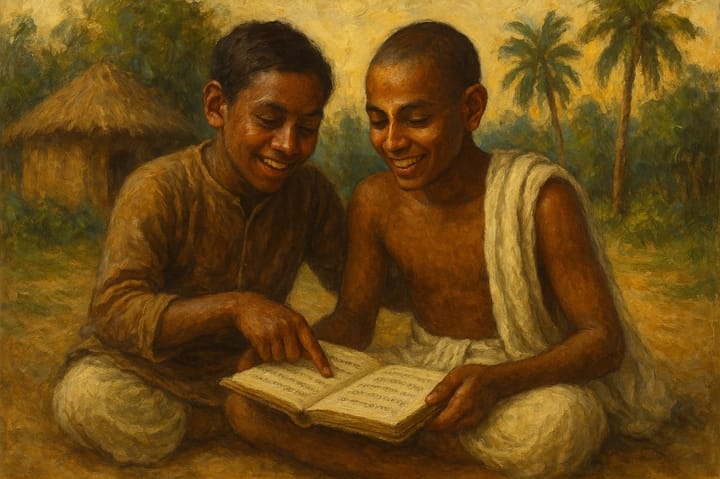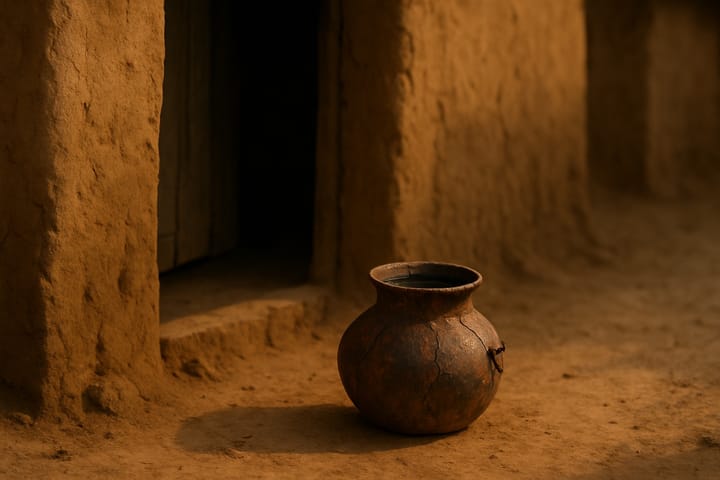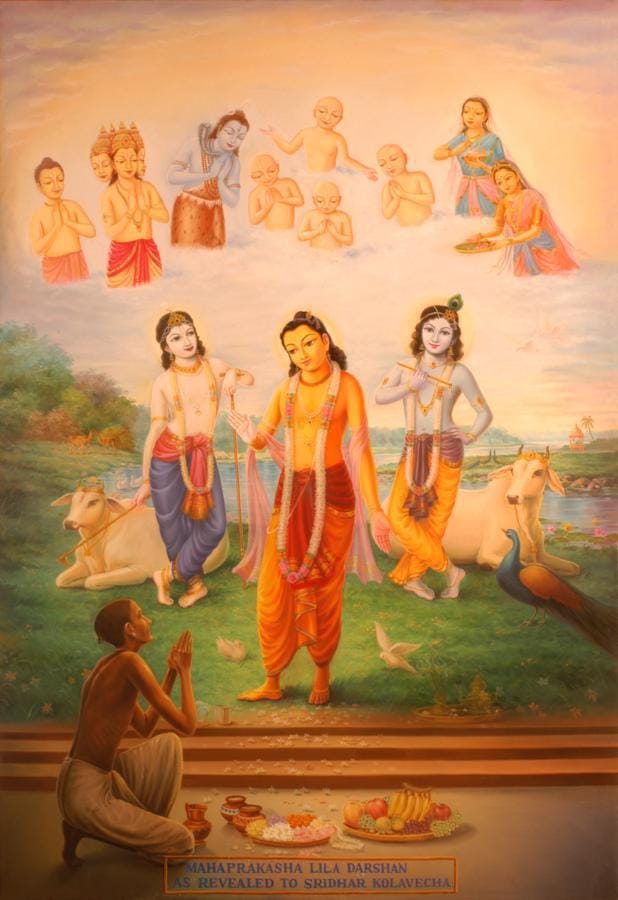What Gives Me Hope

New Year’s Day, the day billions of people around the world make new resolutions, has coincided with Ekādaśī Eve, the infinitely more powerful day to make resolutions.
Unless you're like Dhruva, who sustained only on air by breathing once every twelve days, or Jarāsandha, who, despite being continually defeated, attacked Kṛṣṇa with newly formed armies eighteen times, you've most likely not always followed through on your resolutions. Alright, I might be projecting a bit... I'm sure many of you are a lot more self-disciplined than I and don't depend on some extraordinary kind of motivation to do anything. I, unfortunately, am the kind of person who always loves to read all sorts of self-improvement books and gets pumped up to make new resolutions, yet all the steam generally runs out on day two or three.
I do still think that some of these books, like Atomic Habits and Deep Work, provide some pretty helpful, scientifically proven tips for making a system that may work for even the low-motivation types like me, but instead of giving any focus and effort to these types of books this year, I want to get my inspiration from something much more powerful: the lives and teachings of our guru-varga. There are so many wonderful books, like Volcanic Energy and my Paramagurudeva's biography – let these be the drivers of my motivation in 2023.
My plan
This year (or at least till the following Ekādaśī 😅) I will try to fit in some time every day for śravaṇa and kīrtana about the lives of our guru-varga and their teachings.
Although hearing and speaking are the superior forms of śravaṇa and kīrtana, since it is not always so easy for me to do, I'll let reading and writing also count. If I'm feeling stuck not knowing what to write or say, I can use whatever I hear or read as the prompt.
I'll keep track of my progress by adding checkmarks daily to these categories, which I'll send to my friend via WhatsApp message at the end of each day. Actually, this time, instead of checkmarks, I'm going to do something a little more fun, using the śravaṇa-kīrtana-jale analogy:
📥 Śravaṇa
👂= 💦
📖 =💧
👂 & 📖 = 🌦️
📤 Kīrtana
🗣️ = 💦
✍️ = 💧
🗣️ & ✍️ = 🌦️
neither (god forbid!) = ❌
So, over time, the daily report I send will look something like this:
11 days till next Ekādaśī
👂/📖 – 💦💦💧🌦️
🗣️/✍️ – 💧💦🌦️💧
or maybe I'll do it in this format:
9 days till next Ekādaśī
📥 👂👂📖✨✨📖
📤 ✍️🗣️✨✍️✨🗣️
(✨ is for when I do both 👂/📖 or 🗣️/✍️ )
As with everything in bhakti, it is the śraddhā behind our actions that is all important rather than just the actions themselves. Any activity performed without śraddhā is worthless (See Bhagavad-gītā 17.28.). An activity becomes meaningful according to how much śraddhā with which it is performed. So, if I simply artificially and awkwardly ask someone to tell me something about my Gurudeva, Śrīla Prabhupāda, etc., so that I can add a 👂 emoji to my report, then all I'll have accomplished at the end of the day is a particular assortment of emojis.
Should that record be kept on a piece of paper or within our hearts? Only by recording it in our hearts will we be able to analyze our progress.
– Śrīla Bhaktivedānta Vāmana Gosvāmī Mahārāja (full article here)
So this particular exercise won't necessarily indicate significant advancement in bhakti, yet it'll at least help me become more intentional about not letting a day go by without the glories of our guru-varga.
Ādau guru-padāśrayaḥ – first, take shelter of the lotus feet of guru
In Bhakti-rasāmṛta-sindhu 1.2.74, we hear the very first step in bhakti is to take full shelter of the lotus feet of śrī guru.
In the lives of all our guru-varga, we see the pinnacle of guru-padāśraya. Just see how my Śrīla Gurudeva and Śrīla Vāmana Gosvāmī Mahārāja took complete shelter of their Gurudeva right from the beginning (ādau).
A couple days ago I sent out a post here on Vine of Devotion describing how when Śrīla Vāmana Gosvāmī Mahārāja first met Śrīla Bhakti Prajñāna Keśava Gosvāmī Mahārāja at the tender age of nine, he tightly grabbed hold of his feet – so tightly that no one could ever pull him away for the rest of his life.
As a young adult, my Śrīla Gurudeva also, only having corresponded with his Gurudeva through letter, became completely mad with attachment and incapable of remaining a father, husband, policeman – he immediately left everything behind to take complete shelter of his beloved master.
It's never too late
I was born into a wonderful devotee family and my Śrīla Gurudeva mercifully came into my life when I was just a child. Despite my inestimable luck to have been in the most favorable devotional environments throughout my entire life, I've somehow still not yet truly embarked on the path of bhakti by fully embracing this first, most crucial step.
Something that always makes me feel hopeful though, as an aspiring disciple, is when I see those who have never had darśana of my Gurudeva take full shelter of him and become completely addicted to listening to his classes, serving him in different ways, honoring his dear ones and are developing a deeper, more real connection with him than I ever have. So for me, these sincere devotees are the direct proof that it is never too late to start. Even so many years after his disappearance, I haven't missed the boat because the boat is always taking new passengers.
After the last Ekādaśī posting I made, Subhadra Didi responded to the email with such a beautiful homage to my Gurudeva; it filled me with even more hope that I didn’t miss the boat. She kindly allowed me to share it here. I’m feeling inspired now to make the following request:
My Gurudeva’s Vyāsa-pūjā is coming up on 21 January. For those of you who have any appreciation for him – it doesn’t matter if you’ve never met him directly – I’d be very grateful if you could write something. It can even be just a paragraph. I’ll then post your offering here on Vine of Devotion the night before his Vyāsa-pūjā. (You can share it in the Comment section below or email me.)
Hearing to see
The special thing about the life example of transcendental personalities is when we hear about them and their instructions, it doesn't only just give us a little boost of enthusiasm and motivation like we might get by hearing about some great person of the mundane world – so much more happens: we get the opportunity to realize our own personal, very real relationship with them.
Recently in our daily Bhāgavatam readings, we heard about the unbreakable attachment that Rukmiṇī-devī developed for Kṛṣṇa after only hearing about Him. That love and attachment was so powerful that it pulled Kṛṣṇa toward her, and He stole her away.
We often hear how darśana through the ears is superior to darśana through the eyes. My own perception is blocked by so many filters that when I look at transcendental personalities like my Gurudeva, I have an extremely distorted, mundane vision of them. The liquid nectar of their transcendental words, however, has the power to gradually dissolve my many material filters; and when just one drop makes it through and touches my heart, it is powerful enough to completely transform me and turn me into their property. Once I am fully theirs, they can easily shape me into a beautiful offering to offer to Śrī Śrī Rādhā-Kṛṣṇa.
All my attempts to understand them through my own effort and intelligence are bound to fail. They reveal themselves to those who can submissively hear them. All I need to focus on is developing my capacity to receive those words. My Paramagurudeva said:
Because I maintained the conception that Śrīla Prabhupāda was an ordinary human being, none of his words ever entered my ears. Therefore, he would often say, “First prepare your ears (develop transcendental śraddhā). By doing so, you will attain the qualification to hear the siddhānta of the Bhāgavata.” …
Therefore, I pray to the servitors of śrī guru to help me first “prepare my ears”. Until I ready my ears for this purpose, I shall be the subject of the statement “upadeśo hi murkhānam prakopaya na śāntaye – Instructions given to fools serve only to anger them, not pacify them.”
–Śrī Śrīmad Bhakti Prajñāna Keśava Gosvāmī Mahārāja (Rays of The Harmonist No. 16 Kārtika 2006)



Comments ()